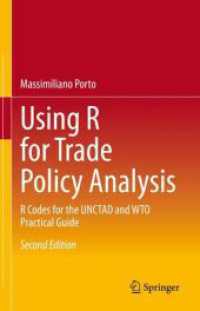- ホーム
- > 洋書
- > 英文書
- > Business / Economics
Full Description
This volume in the Advances in Global Leadership series continues to advance both global leadership research and practice by bridging and integrating conceptual, empirical, and practitioner perspectives to provide a deeper understanding of this rapidly growing field of study. Volume 16 covers moral dilemmas, such as should businesses close operations in global conflict areas to avoid fuelling war or continue the operations to provide a livelihood for people in need? Responsible leadership in India is examined, especially with regards to indigenous perspectives on the emerging economy across the micro, meso, and macro levels of analysis. There is also ground-breaking research on transcultural competence, which questions the very definition of 'global' and an investigation of global leadership and AI. With its finger firmly on the pulse of this exciting field, this is a must-read book for scholars and practitioners alike.
Contents
Part I. Empirical Findings
Chapter 1. Ethical Decision Making in Global Leadership: A Systematic Review; Sabrina Goswami
Chapter 2. Responsible Leadership in India: Insights for Global Leadership Research; Carlo Brighi and Christof Miska
Chapter 3. Responsible Global Leadership in Responses to Global Governance: Evidence from the Global Construction Industry; David Wesley, Sheila M. Puffer, Jack Cordero, Alexandra V. Roth, and Elizabeth M. Moore
Chapter 4. Transcultural Competence for Global Leadership: What If We Focus on Developing Commonalities across Cultures?; Tobias Grünfelder
Chapter 5. Putting Global Back into Global Leadership; Klaus E. Meyer
Chapter 6. Examining the Intersections Between Global Leadership and Relevant Fields of Study; Joyce S. Osland, Mark E. Mendenhall, B. Sebastian Reiche, and Martha L. Maznevski
6A. Managing the Work-Family Interface: A Global Leadership Challenge; Zeynep Aycan and Dilem Cinli
6B. The Intersection Between Intercultural Communication and Global Leadership; Chris T. Cartwright
6C. International Education and Global Leadership; Darla K. Deardorff
6D. Inclusive Leadership in a Turbulent Global World: A Systematic Review and Future Research Directions; Rebecca Chunghee Kim and Hugh Scullion
6E. The Role of Duality Dynamic Balancing and Global Leadership; Yih-Teen Lee and Nana Yaa A. Gyamfi
6F. Armer Schwarzer Kater? An Outside-in Look at Global Leadership Research; Wolfgang Mayrhofer
6G. Global Leadership and Strategic Human Capital in MNEs; Dana Minbaeva
6H. Leadership Lessons from the Swat Pathans: Anthropology and Global Leadership; Fiona Moore
6I. International Diversity and Global Leadership; Minna Paunova
6J. Global Leadership and Language; Guro R. Sanden and Kaisa S. Pietikäinen
6K. The Intersection of Global Leadership and Expatriation; Margaret A. Shaffer and Priyanka Bhowmik
6L. Infusing Ethical Principles into Our Understanding of Complexity: Putting Values at the Center of Global Leadership; Günter K. Stahl, Wendy Chapple, and Christof Miska
6M. Exploring a Real Manager's Approach with a Global Leadership Lens; Gretchen Vogelgesang Lester
Part II. Practitioners' Corner
Chapter 7. Humanity at the Heart of Technological Disruption: An Interview with Digital Anthropologist Rahaf Harfoush; Martha L. Maznevski
Chapter 8. The Diversity Icebreaker -- Changing the World One Seminar at a Time: An Interview with Bjørn Ekelund; Joyce S. Osland
Chapter 9. Generative Artificial Intelligence (AI) as a Co-pilot for Teaching Cases in Business Schools; Mark E. Mendenhall, B. Sebastian Reiche, and Anthony Mendenhall
Chapter 10. Learning Without Borders: Developing Global Leaders Who Amplify Impact by Realizing Extraordinary Ideas; Arshad Ahmad and Nancy J. Adler
-

- 洋書電子書籍
- 副子固定・石膏固定ハンドブック(第2版…
-

- 電子書籍
- BLEACH カラー版 73 ジャンプ…






